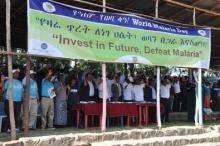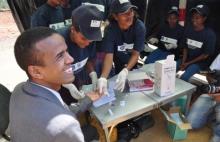Ethiopia on Track to Achieve Millennium Development Goal 6 Thanks to Remarkable Progress in Malaria Control
BAHIR DAR, 25 April 2014. The past decade has seen unprecedented progress in malaria control. Cases and deaths have declined dramatically worldwide, but most especially in sub-Saharan Africa. World Malaria Day, 25 April 2014, highlighted the progress to date and joint efforts to defeat malaria under the theme "Invest in the Future, Defeat Malaria". In Ethiopia, the main commemoration was held in Bahir Dar, Amhara Region, which is a malaria endemic area where great progress has been achieved to control malaria.
The progress in Ethiopia and worldwide comes following a massive increase in the use of mosquito nets, the expansion of programmes to spray the insides of buildings with insecticides, and improvements in the rapid detection and treatment of cases. In Ethiopia, preventive and case management interventions, as well as rapid response to outbreaks to avoid epidemics and the deployment of health extension workers (HEWs) to provide community-based preventive, promotive and curative health services to villages, communities and households, have contributed to significant gains in malaria control. However, emerging drug and insecticide resistance threaten to reverse recent gains, and more funds and joint efforts are urgently required to sustain the progress to date.
In Amhara region, Dera woreda, Wonchit kebele health post is an example of best practice in malaria control. 1610 bed nets are being used in the kebele, which consists of 1883 households in total, and 93% of the nets are insecticide sprayed. The health extension worker in the kebele is experienced in treating malaria, and the community is also well trained in detecting the early signs of malaria, as well as the ways to prevent it. These factors have contributed to the reduction of malaria cases in the community.
"It is high time to strengthen the integrated malaria prevention and control strategies to keep up the momentum of the nation’s fast economic growth and development," said Dr Amir Aman, State Minister for Health, said on World Malaria Day, 25 April, in Bahir Dar. Representing WHO, Dr Esther Aceng, affirmed WHO's commitment to continue working with the Federal Ministry of Health and key partners to support Ethiopia to accelerate progress towards the attainment of malaria elimination in the selected historically low transmission areas by the year 2020.
World Malaria Day 2014 was commemorated with a parade and mass run headed by the State Minister for Health, Deputy Head of Amhara Regional Health Bureau, Government officials, Representatives of UN agencies, partner organizations in the area of malaria prevention and control, as well as students and city dwellers of Bahir Dar. The commemoration also featured circus performances, drama and a 'Test and Treat' activity to raise awareness on malaria prevention and treatment methods.
World Malaria Day was instituted by WHO Member States during the 2007 World Health Assembly. It is an occasion to highlight the need for continued investment and sustained political commitment for malaria control and elimination. The theme for the 2013-2015 campaign is: "Invest in the future. Defeat malaria."






